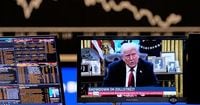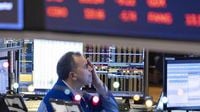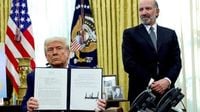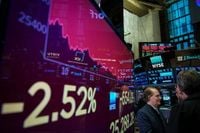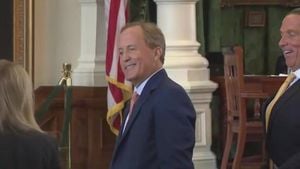On April 3, 2025, the financial markets across Europe reacted sharply to the announcement of reciprocal tariffs by U.S. President Donald Trump, leading to significant declines in stock exchanges and a notable increase in the price of gold. Milan's stock exchange fell by 2.12%, closing at 37,640 points, while the Stoxx 600 index, which tracks major European stocks, decreased by 1.3%.
The spread between Italian BTPs and German Bunds dropped to 111 points, with the yield on the Italian ten-year bond at 3.76% and the German bond at 2.64%. In the wake of the tariff announcements, the dollar weakened, losing 0.5% against the euro and trading at 1.0910.
European markets opened in the red, with Paris down 1.8%, Frankfurt 1.5%, London 1.3%, and Madrid 1.2%. The negative sentiment was echoed across Asia, where the Nikkei index in Tokyo fell by over 3% and the Hang Seng index in Hong Kong dropped by 1.6%. The yen, traditionally seen as a safe haven, gained against the dollar, trading at 147.17.
European Commissioner for Trade Maros Sefcovic condemned the tariffs as "unjustified and inevitably counterproductive," stating, "We will act calmly, carefully, and united while calibrating our response, leaving enough time for talks. However, we will not remain inert if we cannot reach a fair agreement." Sefcovic is set to speak with his U.S. counterparts on April 4, 2025.
Spanish Prime Minister Pedro Sanchez announced a mobilization of 14.1 billion euros to counter the tariffs, which he labeled as a "unilateral attack" by the U.S. Sanchez urged Trump to reconsider his decision and engage in negotiations with the EU and the rest of the world. "The U.S. is returning to 19th-century protectionism," he asserted.
In the luxury sector, which was hit hardest by the tariffs, companies like Adidas and Pandora saw declines of 10% and 12%, respectively. The technology sector also suffered, with Logitech International dropping 11% and Nokia down 5%. The automotive sector experienced a slight decline of 0.9%, but Stellantis managed a modest gain of 0.8%.
Gold prices surged to a new record, reaching $3,167 per ounce shortly after the tariff announcement, reflecting the metal's status as a safe haven during times of economic uncertainty. By late morning, gold was trading at $3,131.97, marking a 0.5% increase.
JPMorgan warned that if the U.S. maintains the tariffs, there is a risk of recession for both the U.S. and global economies in 2025. The bank noted that the tariffs could result in an annual tax increase of $660 billion for Americans, representing the largest tax hike in recent memory.
French Prime Minister Francois Bayrou described the tariffs as a "catastrophe" for both Europe and the U.S., emphasizing the immense difficulties they pose for the global economy. He stated, "This decision is a catastrophe for the economic world; it is immense hardship for Europe and also for the United States and its citizens."
The President of the German automotive industry, Hildegard Mueller, criticized Trump's approach, stating, "This protectionism will only lead to losers. The EU must respond strongly while signaling a willingness to negotiate."
As the markets continued to react to the tariffs, European stock exchanges were not the only ones feeling the pressure. Wall Street also faced a significant downturn, with the Dow Jones Industrial Average down by 2.42%, the Nasdaq plunging by 4.5%, and the S&P 500 losing 3.55%.
Apple, Amazon, and Tesla were among the biggest losers on Wall Street, with Apple down 6.85%, Amazon dropping 6.05%, and Tesla declining 6.10%. The overall sentiment in U.S. markets reflected concerns over the economic implications of the tariffs.
In response to the tariffs, the European Commission President Ursula von der Leyen announced a press conference to address the situation and reassure investors. She warned that the uncertainty would lead to further protectionism and could have dire consequences for millions globally, particularly the most vulnerable populations.
Back in Italy, the banking sector took a significant hit, with Bper Banca experiencing the most substantial losses, trading down 4.6%. Other major banks like Unicredit and Popolare Sondrio also suffered declines of 4% and 3.8%, respectively.
The Italian government, under the leadership of Prime Minister Giorgia Meloni, has been actively monitoring the situation, canceling scheduled commitments to focus on potential responses to the U.S. tariffs. Meloni's administration aims to mitigate the impact of the tariffs on the Italian economy.
Overall, the markets on April 3, 2025, reflected a climate of uncertainty and anxiety as investors processed the implications of the U.S. tariffs. The situation remains fluid, and the reactions from global leaders and markets will likely continue to evolve in the coming days.
